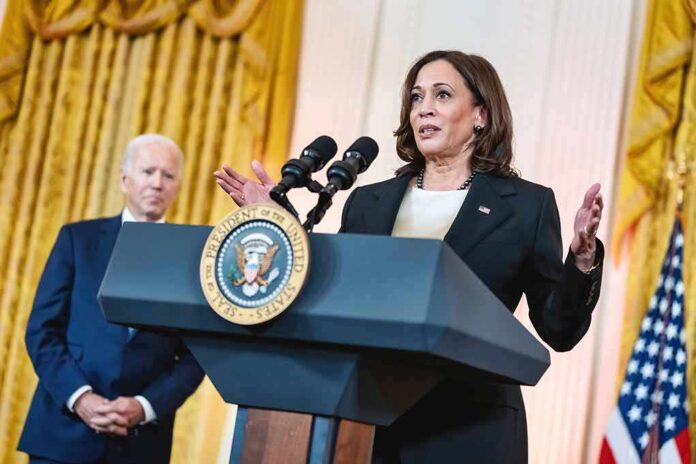Kamala Harris desperately tries to derail President Trump’s historic mega bill with false claims about healthcare losses and tax cuts for billionaires, even as the legislation moves swiftly toward becoming law.
Key Takeaways
- Kamala Harris is attempting to rally opposition against President Trump’s “One Big Beautiful Bill Act” which has already passed the Senate with Vice President JD Vance’s tie-breaking vote
- Harris claims without evidence that 17 million Americans would lose healthcare and rural hospitals would close if the bill becomes law
- She falsely characterizes the legislation as benefiting billionaires at the expense of working Americans
- Republicans are pushing to have the bill signed into law by Independence Day, July 4th
- The former Vice President is urging citizens to contact their representatives to oppose the bill before the House vote
Harris Launches Last-Ditch Effort Against Trump’s Signature Legislation
As President Trump’s comprehensive “One Big Beautiful Bill Act” advances through Congress after passing the Senate with Vice President JD Vance’s tie-breaking vote, former Vice President Kamala Harris has launched a desperate campaign to derail the legislation. Harris’s opposition comes as Republicans are working diligently to deliver the bill to President Trump’s desk by July 4th, marking a significant legislative achievement for the administration. The megabill represents a fulfillment of key campaign promises made by Trump during the 2024 election, and its passage would solidify his administration’s policy agenda early in his term.
Fearmongering Claims Without Evidence
In her criticism of the legislation, Harris has made several unsubstantiated claims about the potential impact of Trump’s megabill. She asserted that 17 million Americans would lose their healthcare coverage, rural hospitals would be forced to close, and 3 million Americans including veterans and seniors would lose food assistance. These alarming predictions appear designed to generate public opposition rather than engage with the actual content of the legislation. Harris further claimed that American families would see their energy bills increase by approximately $400 annually, though she provided no methodology or source for this specific figure.
Harris also reverted to standard leftist talking points by characterizing the bill as funding “$1 trillion in tax cuts for billionaires” at the expense of working Americans. This divisive rhetoric ignores the economic benefits that tax reform has historically provided to Americans across all income levels through job creation, wage growth, and economic expansion. The former Vice President’s claims appear aimed at mobilizing her base rather than offering a substantive critique of the legislation’s provisions or presenting viable alternatives.
Call to Action as Bill Advances to House
With the Senate hurdle cleared and the bill now moving to the House of Representatives, Harris has issued a call to action for citizens to pressure their representatives to vote against the legislation. “This fight is not over. Call your representative and tell them to vote against this devastating bill,” Harris urged in her statement. This desperate plea comes as Republicans hold a solid majority in the House, making the bill’s passage highly likely despite Harris’s opposition. The timing of her push appears calculated to generate last-minute resistance before the bill reaches President Trump’s desk.
Republican Support and Path Forward
While Harris attempts to rally opposition, Republican lawmakers have expressed strong support for the comprehensive legislation, which addresses multiple policy priorities in a single package. The “One Big Beautiful Bill Act” represents a strategic approach to implementing President Trump’s agenda efficiently rather than navigating numerous separate bills through Congress. This legislative strategy demonstrates the administration’s commitment to delivering on campaign promises swiftly and effectively, contrasting sharply with the legislative gridlock that characterized previous administrations.
As the bill moves toward final passage, the stark contrast between the Trump administration’s proactive governance and Harris’s reactive opposition highlights the fundamental policy differences that defined the 2024 election. With Republicans controlling both chambers of Congress and the White House, the path appears clear for President Trump to sign this signature legislation into law by Independence Day, delivering a significant victory for his administration and the American people who elected him to implement these policies.











